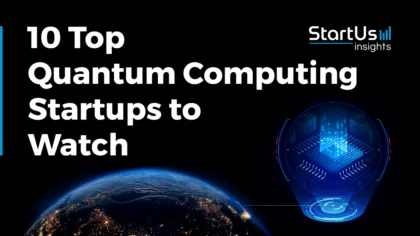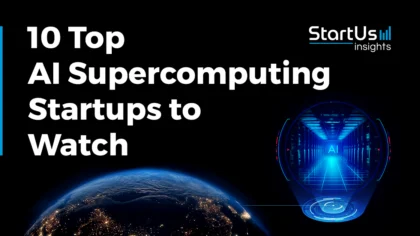Accelerate Productivity in 2025
Reignite Growth Despite the Global Slowdown
Technological advances in the knowledge economy enhance global innovation and competitiveness, as well as human capital development. For example, robotization and quantum computing use automation and high-performance computation to optimize knowledge creation and dissemination tasks. AI-generated knowledge and digital system competency, on the other hand, improve knowledge quality and accessibility. Further, blockchain knowledge management and open innovation & science increase trust and collaboration. This research provides you with the top 10 knowledge economy trends, ranging from AI-generated knowledge and 5G knowledge network to blockchain and information cloud technology. Read more to explore each trend and how they impact your business.
Innovation Map outlines the Top 10 Knowledge Economy Trends & 20 Promising Startups
For this in-depth research on the Top Knowledge Economy Trends & Startups, we analyzed a sample of 1449 global startups & scaleups. This data-driven research provides innovation intelligence that helps you improve strategic decision-making by giving you an overview of emerging technologies in the knowledge-based economy. In the Knowledge Economy Innovation Map, you get a comprehensive overview of the innovation trends & startups that impact your company.
These insights are derived by working with our Big Data & Artificial Intelligence-powered StartUs Insights Discovery Platform, covering 3 790 000+ startups & scaleups globally. As the world’s largest resource for data on emerging companies, the SaaS platform enables you to identify relevant technologies and industry trends quickly & exhaustively.
Tree Map reveals the Impact of the Top 10 Knowledge Economy Trends
Based on the Knowledge Economy Innovation Map, the Tree Map below illustrates the impact of the Top 10 Knowledge Economy Trends in 2023. Startups and scaleups are developing solutions for enhancing knowledge production and dissemination. AI-generated knowledge, the most prevalent trend, allows researchers to generate novel insights and hypotheses from large datasets. Digital system competency is upskilling the workforce to adapt to changing demands of the digital economy. Further, cybersecurity improves protection and facilitates the sharing of sensitive information. Blockchain knowledge management and information cloud technology also bring transparency and efficiency into knowledge creation and distribution. Open innovation and science foster collaboration and co-creation while knowledge analytics and quantum computing lead to better decision-making and problem-solving. Lastly, robotization and the 5G knowledge network support the automation and connectivity of knowledge-intensive activities.
Top 10 Trends in Knowledge Economy
- AI-generated Knowledge
- Digital System Competency
- Blockchain Knowledge Management
- Open Innovation & Science
- Information Cloud Technology
- Cybersecurity
- Knowledge Analytics
- Robotization
- Quantum Computing
- 5G Knowledge Network
Global Startup Heat Map covers 1449 Knowledge-based Economy Startups & Scaleups
The Global Startup Heat Map below highlights the global distribution of the 1449 exemplary startups & scaleups that we analyzed for this research. Created through the StartUs Insights Discovery Platform, the Heat Map reveals high startup activity in Western Europe, followed by the US and India. Below, you get to meet 20 out of these 1449 promising startups & scaleups as well as the solutions they develop. These innovation-driven knowledge economy companies are hand-picked based on criteria such as founding year, location, funding raised, & more. Depending on your specific needs, your top picks might look entirely different.
Top 10 Trends in Knowledge Economy (2023)
1. AI-generated Knowledge
In the knowledge economy, AI-generated knowledge transforms information and data into valuable insights and solutions. Using natural language processing (NLP), recommendation systems, generative models, and creative applications, AI systems produce novel and relevant content for various domains and audiences. Further, AI-assisted research help researchers find, analyze, and synthesize information from multiple sources. Many companies are developing innovative solutions for AI-generated knowledge using technologies such as deep learning, transformers, OpenAI’s GPT-3, and Google’s BERT.
Nuron delivers AI-driven Intelligence
US-based startup Nuron develops a platform that helps engineers and scientists leverage AI for knowledge discovery, analysis, and insights. It connects to various data and knowledge sources, both internal and external, and automates complex tasks with custom AI modules. Further, the platform builds a self-evolving and learning network of data, documents, text, and images for decision-making. Nuron thus facilitates global collaboration and report automation, saving time and cost.
LEX AI facilitates Legal Knowledge Creation
German startup LEX AI builds a legal tech platform that utilizes AI to provide legal research, knowledge creation, and community features for legal professionals. It allows lawyers and regulatory experts to manage the flow of updates in laws and regulations from various sources. This includes lawmakers, courts, regulators, and subject-matter experts. Further, the platform offers a global networking community for legal professionals to present their expertise, interact with their peers, and reach out to potential clients. With its platform, LEX AI increases efficiency in legal research and knowledge management.
2. Digital System Competency
Digital system competency facilitates the use of digital technologies and systems creatively, critically, and without assistance. It encompasses various aspects such as digital literacy, data literacy, adaptive learning, and continuous skill development. These competencies enable individuals and organizations to perform tasks, solve problems, communicate, collaborate, create, and share content effectively. Businesses are also leveraging software and tools with gamification elements and personalization to keep the workforce engaged.
Neuro builds a Social Knowledge Platform
Australian startup Neuro creates a social ecosystem based on neuroscience. The startup’s platform features a social media network that improves neural literacy, helps people interact with information, and mobilize knowledge. It offers decentralized, distributed fact-checking through its neuro-peer network. Further, the platform enables pro-social rewards for peer reviews, pseudonymous publishing on sensitive topics, and academic outreach opportunities. The startup’s approach emphasizes ethical technologies, systems thinking, and neuroethics as the foundation for scientific progress. This provides people with new means for learning and functioning online while aligning collective values and supporting individual differences.
AirV Labs creates an Interactive Mixed Reality (IMR) Environment
Indian startup AirV Labs makes IMR content for advanced digital curriculums and e-learning platforms. It leverages AI to enhance the immersive learning experience of learners in various domains such as healthcare, medical, and industrial design. The startup uses its patented virtual reality (VR) authoring tool and software development kit to integrate 360 degrees video with virtual, augmented, and AI. AirV Labs thus provides innovative, cost-effective, and scalable VR solutions for online education and training.
3. Blockchain Knowledge Management
In the knowledge economy, blockchain technology is used for managing and sharing digital resources in a decentralized and trustless way. Blockchain knowledge management also allows companies to create decentralized knowledge repositories that store and distribute knowledge assets. Moreover, this eliminates the reliance on a central authority or intermediary. It also facilitates knowledge exchange through smart contracts. They automate the transactions and agreements between knowledge providers and consumers, such as licensing, pricing, and quality assurance.
ProofEasy provides Immutable Blockchain Storage
Singaporean startup ProofEasy develops a blockchain document management platform to eliminate document forgeries, fraud, and counterfeits. The startup utilizes its patented VeriDoc QR code solution, which uses public-key cryptography and places the unalterable unique hash value on the blockchain. This enables educational institutions to create, issue, and store tamper-proof e-certificates and documents. These are verified instantly by scanning the QR code using a smart device. ProofEasy offers academic institutions a simple, reliable. and cost-effective method for protecting and verifying the source of truth.
Motiv builds Bitcoin-powered Micro-Economies
US-based startup Motiv leverages blockchain to build skills and knowledge in various dimensions. It equips communities with Bitcoin to make purchases for survival items, such as food and clothing. Further, the startup’s solution provides them with education on cell phone usage, app downloads, and achieving financial stability. Motiv promotes Bitcoin circular economies and financial literacy while enabling easy global fund transfers without the need for traditional banks.
4. Open Innovation & Science
The democratization of digital technologies advances open innovation and science. This approach integrates open and collaborative research practices along the entire process of generating and disseminating new scientific knowledge. It relies on the production, distribution, and use of knowledge as a key driver of growth and development. Further, such an approach leverages open data, data sharing, open-access publishing, collaborative research platforms, and other tools. This increases the transparency, inclusiveness, and democratization of science. Startups are also adopting open innovation and science principles and methods to create novel and impactful solutions.
Arcadia develops an Open Science Ecosystem
US-based startup Arcadia Science leverages the biology of organisms to create novel solutions for various industries. Using open innovation and science, the startup collaborates with academic and industrial partners to accelerate the translation of scientific discoveries into marketable products. The technology platform combines genetic engineering, synthetic biology, and bioinformatics to engineer organisms with desired traits and functions. Arcadia Science offers a diverse portfolio of bioproducts and services that speeds up the research, development, and commercialization process.
Tripple aids Open Innovation Management
Colombian startup Tripple offers an innovation management platform for organizations wanting to leverage the power of collective innovation. It enables organizations to post their challenges and receive solutions from a global community of problem solvers. Not only this, the startup’s web-based platform allows users to identify, share, evaluate, interact, monitor, and collect ideas for any kind of challenge. Tripple helps organizations generate value by finding creative and effective solutions through co-creation.
5. Information Cloud Technology
Cloud computing is a key driver of the knowledge economy as it removes IT overhead associated with knowledge sharing. Further, it facilitates collaboration and communication among diverse and distributed stakeholders, such as researchers, practitioners, policymakers, and citizens. Cloud technology enhances the capacity for knowledge discovery and problem-solving by providing access to vast amounts of data and computational resources. Some of the emerging solutions include serverless computing as well as cloud-based collaboration and productivity tools. Cloud-based data analytics and business intelligence services also deliver scalable and cost-efficient means for businesses to improve decision-making.
writeaguide creates a Cloud Knowledge Base
German startup writeaguide develops a cloud-based platform that enables smart knowledge management for organizations. It allows them to create, share, optimize, and analyze the knowledge of the teams in one place. It features gamification, workflows, specializations, and certificates to motivate the team and improve the knowledge culture. Further, the platform provides data-driven insights into the knowledge processes, such as progress tracking, knowledge transfer, and knowledge gaps. With writeaguide’s solution, organizations prevent the loss of knowledge, shorten the onboarding and training time, reduce mistakes, and increase efficiency.
Pinecrow enables Cloud-based Knowledge Management
US-based startup Pinecrow builds a cloud-based knowledge management platform for research. It helps businesses find, curate, and share insights from their primary and secondary research data sources. The platform utilizes cloud computing to connect with various data providers, such as survey platforms, research vendors, internal databases, and more. Further, it aids data discovery through a simple keyword search. The startup also features powerful visualizations, insightful storyboards, and smart project management tools to automate the research workflow and democratize insights. With its platform, Pinecrow saves time and resources for market researchers, research leaders, insights partners, and research vendors.

6. Cybersecurity
Digitizing access to knowledge makes the infrastructure prone to cyber-attacks. To tackle this, businesses are adopting novel cybersecurity solutions like zero trust architecture (ZTA). ZTA assumes that no network or device is inherently trustworthy and requires continuous verification and validation. Additionally, the use of threat intelligence and information sharing helps organizations identify and respond to emerging cyber threats and vulnerabilities. Further, identity and access management (IAM) is another crucial aspect of cybersecurity. It ensures that only authorized users and devices access sensitive data and resources. Other cybersecurity measures include biometrics and quantum cryptography.
Filigran offers Cyber Threat Intelligence
French startup Filigran provides OpenCTI, a cyber threat intelligence platform for crisis management. It allows organizations to store, organize, visualize, and share knowledge about cyber threats. The platform uses a knowledge hypergraph and performs automated reasoning to derive implicit facts and associations. It also integrates with other tools and applications through connectors. Filigran helps organizations improve their situational awareness and decision-making in the face of cyber threats.
Cybermonic delivers Cybersecurity Software-as-a-Service
US-based startup Cybermonic allows businesses to scale securely while maximizing the value of their cybersecurity investment. It gathers and combines critical information on the network without the need for predefined instructions or guidelines. The startup’s product, the Cyber Knowledge Graph, ingests heterogeneous data sources and provides instant correlation and analysis. This enables analysts to triage alerts faster and more accurately, saving time and money. Cybermonic helps businesses establish secure operations and safeguard their critical data and infrastructure.
7. Knowledge Analytics
Knowledge analytics transforms data into actionable insights for decision-making and innovation. It utilizes advanced data visualization, predictive analytics, knowledge graphs, and semantic technologies. These technologies simplify the extraction, integration, analysis, and presentation of complex and heterogeneous information. It also helps organizations gain a deeper understanding of their data, discover new patterns and relationships, and generate novel solutions. To generate insights, businesses now integrate machine learning, NLP, graph databases, and semantic web standards into their data intelligence platforms.
Gleensite enables Predictive Analytics Mapping
UK-based startup Gleensite provides predictive analytics mapping software for various sectors. The startup’s platform collects and transforms spatiotemporal datasets from global sources, as well as allows businesses to upload their own data. It applies modulable and adaptive predictive models using machine learning algorithms to find patterns and make better predictions. Further, it shows real-time insights and adds a personalized interface that lets companies explore different scales of space and time. Gleensite helps businesses make better decisions by identifying emerging trends, opportunities, risks, and impacts across different regions.
Cogniquest AI offers Contract Analytics
Indian startup Cogniquest AI provides contract intelligence solutions for the knowledge economy. It combines machine learning and NLP to extract critical data from legal contracts, service agreements, sale deeds, etc. This helps businesses track key terms, store contracts in a centralized repository, and perform analytics on their contract data. Further, it offers integration-ready solutions that connect with contract authoring, governance, and enterprise resource planning (ERP) systems. By using Cogniquest AI, businesses achieve process efficiency, reduce risks, and gain insights.
8. Robotization
In the knowledge economy, robotization enables businesses to streamline and scale tasks across various domains. It utilizes intelligent process automation (IPA), hyper-automation, robotic process automation (RPA), AI, machine learning, and more. Robotization automates complex processes that require cognitive abilities. Further, robotization involves the use of intelligent virtual agents, such as chatbots and voice assistants, that interact with customers and employees using NLP and sentiment analysis. Such solutions enhance communication workflows including internal and customer channels.
CTWO offers Intelligent Orchestration
UK-based startup CTWO provides intelligent orchestration solutions for maximizing the use of the digital workforce. It leverages robotization and AI to automate complex and repetitive tasks, such as data analysis, document processing, and customer service. CTWO’s platform integrates various tools and applications, such as search engines, chatbots, and cloud services. The startup enables enterprises to optimize their workflows, reduce costs, and improve quality and efficiency. CTWO help businesses transform their digital operations and gain a competitive edge in the rapidly changing market.
AITalenX builds Educational Robots
Chinese startup AITalenX develops AISTEAM, a series of smart robots that perform various tasks in education, entertainment, service, and security. They use AI, micro-brain programming, wireless communication, and sensor technology to interact with humans and the environment. The robots are designed to be easy to use, customizable, and adaptable to different scenarios and needs. AITalenX offers businesses a cost-effective, reliable, and versatile way to enhance their productivity, efficiency, and competitiveness.
9. Quantum Computing
Using quantum mechanics allows businesses to process data faster and more efficiently than classical computers. This enables new applications and discoveries in various fields. Startups are developing novel hardware, software, and algorithms that leverage quantum technology. For leveraging quantum computing, researchers leverage superconducting qubits, trapped ions, photonic circuits, quantum annealing, and quantum machine learning. Along with being a scientific breakthrough, quantum computing is also a strategic opportunity for businesses and society.
Multiverse Computing builds Quantum & Quantum-inspired Algorithms
Spanish startup Multiverse Computing makes quantum software that leverages quantum computing to solve complex problems. The startup’s quantum platform, Singularity, utilizes variational quantum algorithms that run on quantum devices and achieve optimal results. Its Singularity software development kit (SDK) delivers quantum software plug-ins for a wide range of applications, including machine learning and simulations. Multiverse Computing thus empowers professionals across all industries to apply quantum computing solutions without requiring in-depth knowledge of quantum computers.
Algorithmiq offers Quantum Computing for Life Science
Finnish startup Algorithmiq develops quantum computing algorithms for the life sciences industry. They run on near-term quantum devices to discover new drugs and develop new materials. The startup combines its expertise in quantum information, complex systems, and computational physics to create smart codes. This allows researchers to tackle real-world challenges in life sciences that positively impacts people’s health and well-being.
10. 5G Knowledge Network
5G networks enable combine enhanced mobile broadband (eMBB), internet of things (IoT) connectivity, remote collaboration and telepresence, and network automation and orchestration. These allow for high-speed data transmission, massive device connectivity, immersive and interactive communication, as well as and flexible network management. A 5G knowledge network facilitates the creation, sharing, and application of knowledge among different stakeholders, such as researchers, entrepreneurs, and policymakers. Many startups are leveraging 5G and developing solutions for smart cities, digital health, industrial automation, and education to enable real-time data processing.
BEAMTEL builds a 5G Ecosystem
Moroccan startup BEAMTEL enables organizations to leverage 5G in driving digital transformation. The startup utilizes the millimeter wave spectrum to deliver high-speed and low-latency connectivity for diverse applications. By integrating 5G connectivity into their products and services, BEAMTEL allows businesses to enhance their operations, optimize processes, and improve overall efficiency.
Chronicle Cloud develops a 5G-Edged Note-Taking Platform
US-based startup Chronicle Cloud makes a 5G-edged note-taking platform to help teachers access and transmit large amounts of data at very low latency speeds. It enables them to maximize student success by monitoring individual and group learning outcomes based on research-based best practices. The platform uses cloud computing, AI, and NLP to provide teachers with an action-oriented lesson plan, formative assessment, and conferring notes. Chronicle Cloud helps educators and schools to improve the quality of teaching and learning to increase student engagement and achievement.
Discover all Knowledge Economy Trends, Technologies & Startups
The knowledge economy is a dynamic phenomenon with implications for work, education, innovation, and society. It demands new skills, competencies, and mindsets that enable adaptation to changing environments and opportunities. Further, a knowledge-based economy needs to deal with inequality, digital divide, ethical dilemmas, and environmental impacts. Hence, it is vital to cultivate a culture of lifelong learning, innovation, collaboration, and responsibility to deploy a data-driven economy for everyone’s benefit. The Knowledge Economy Trends & Startups outlined in this report only scratch the surface of trends that we identified during our data-driven innovation & startup scouting process. Identifying new opportunities & emerging technologies to implement into your business goes a long way in gaining a competitive advantage.
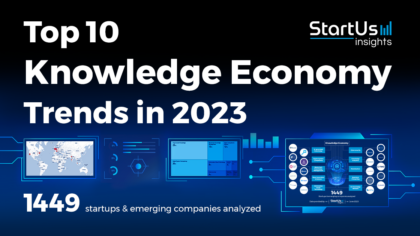
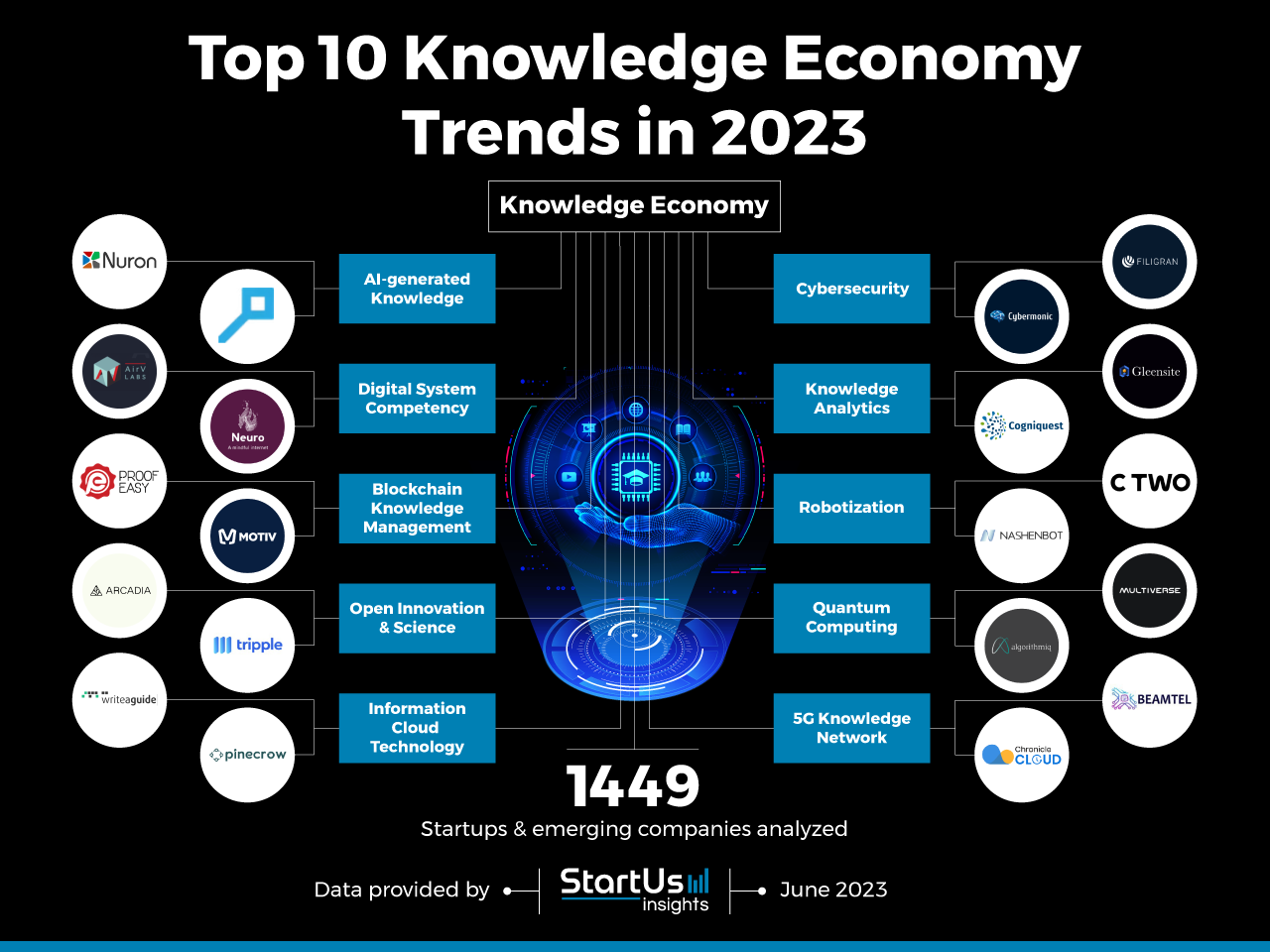
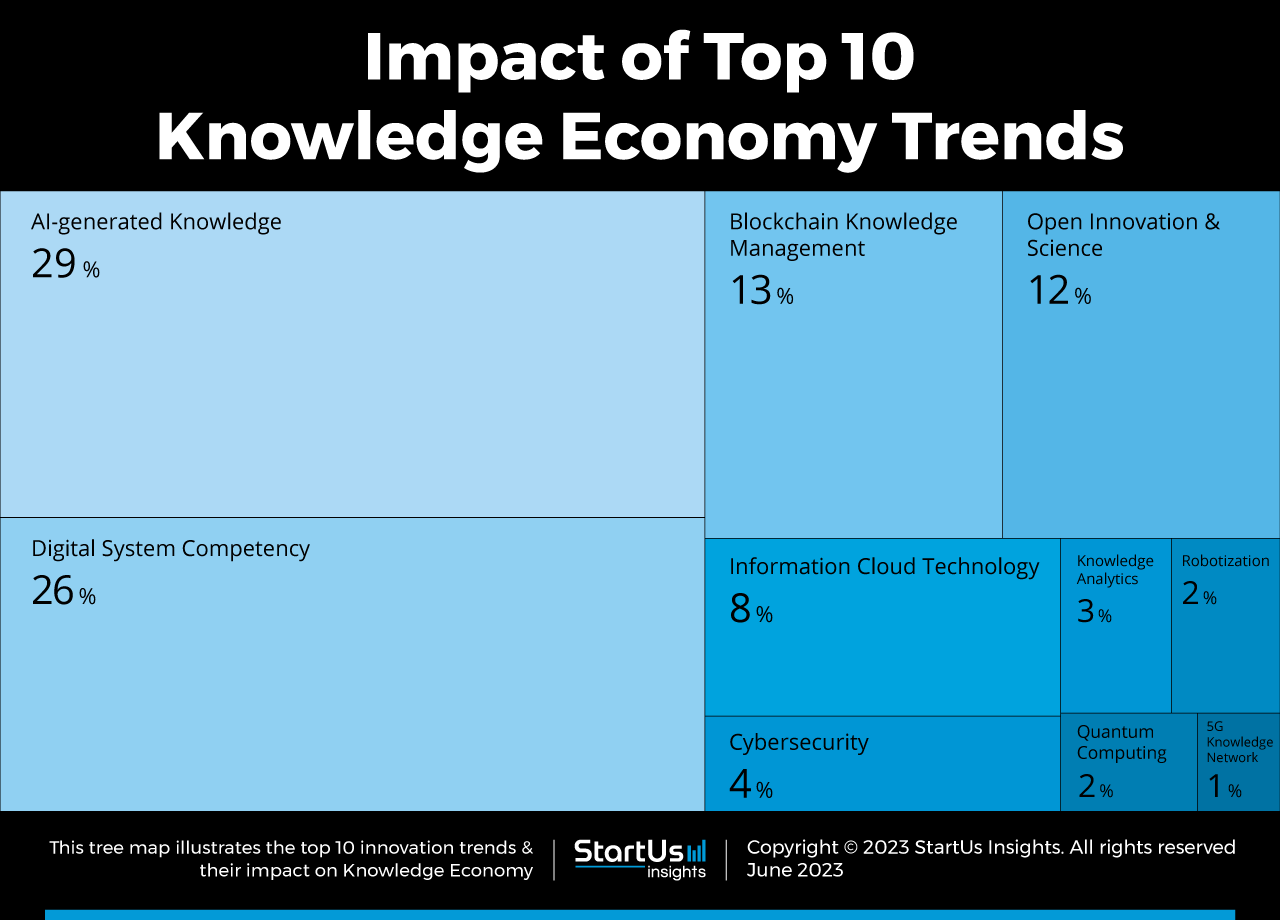
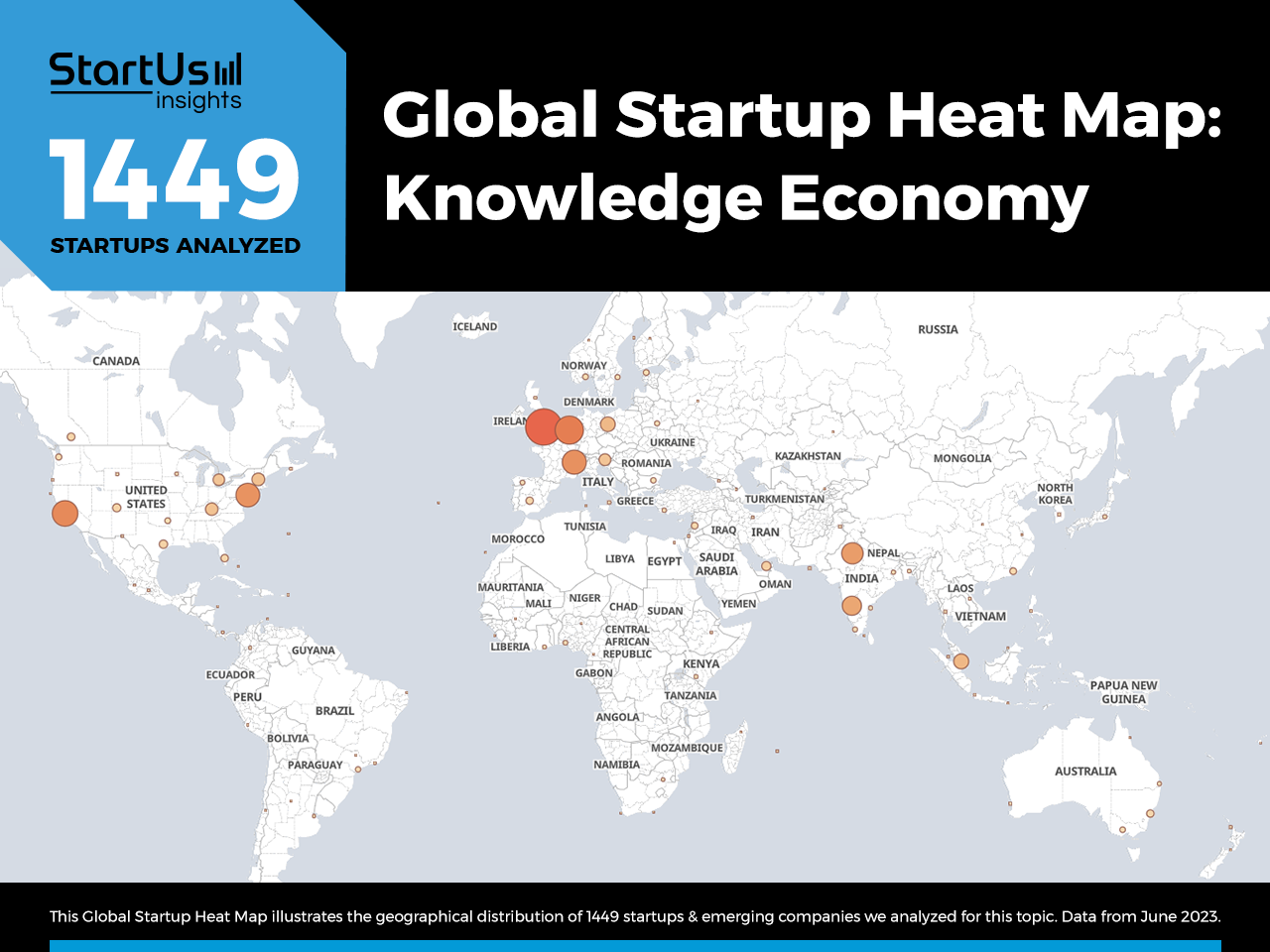
![Future of Robotics: 12 Trends Powering the Next Wave [2025-2030]](https://www.startus-insights.com/wp-content/uploads/2025/06/Future-of-Robotics-SharedImg-StartUs-Insights-noresize-420x236.webp)
